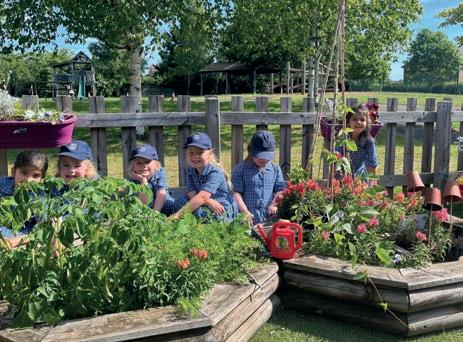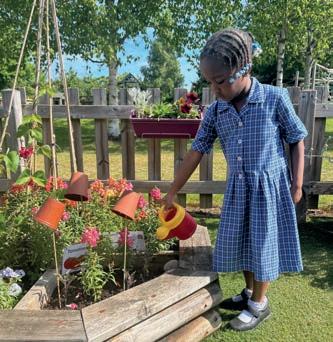
3 minute read
Outdoor Learning


Advertisement


Benefits of outdoor learning


Playing outdoors o ers children access to new, open, and large spaces, with fantastic opportunities to be their natural, exuberant, physical, and noisy selves. Being outdoors o ers the space and ability to move freely with physical and mental positives for children. This encourages a healthy lifestyle from a young age. Children create a sense of appreciation and understanding for the natural environment when they experience it rst-hand. Learning about the world around them, from how things grow to where they live, from the seasons to the weather, every experience helps to build a child’s knowledge and awareness of the world. Experiencing the feel of the rain tapping on their heads and the cold on their hands and cheeks. Seeing living animals crawling on their hands, peering down a rabbit hole and observing a sun ower grow, these are all learning opportunities that enable children to grow as caring and considerate individuals, with awareness for the world around them.
Being outdoors also o ers sensory experiences to explore and learn, developing gross motor skills, running, walking, bending, stretching as well as ne motor skills for example collecting smaller items such as leaves and conkers.
Children can develop di erent skills from the outdoors, skills they may not be able to develop indoors. Social skills can be improved from experiences sought outside, interacting with peers and adults in di erent environments. Many children develop con dence from outdoors, where spaces are not so con ned and areas that can sometimes be less noisy than the indoor learning environment. Some children can nd this a more calming learning space. The outdoors can encourage independence, allowing children to risk take and explore environments they may not otherwise get access to. The outdoors can o er problem solving skills and opportunities, the ability to use imagination and di erent resources to support this such as during role play. Turn taking skills and developing relationships are often discovered through activities outdoors, for example waiting for a turn to balance along a fallen tree trunk. The outdoors also o ers many pedagogy areas for learning, literacy, maths, science, and sustainability too, giving the early years a good grounding at the start of their learning within these subjects. Areas within the EYFS framework can be assessed and bene ted from being experienced outdoors o ering di erent ways of encompassing the early learning goals within a setting. Personal, social, and emotional, communication, language and literacy, problem solving, mathematics and reasoning, knowledge and understanding of the world around them and physical development as well as creative opportunities are all available from being outside. Activities outside can be set up or discovered by children themselves creating many learning opportunities in a calming outdoor space, many children thrive in this environment.
The outdoor environment also o ers many well-being bene ts, equipping children for their future, allowing them to self-regulate, feel emotions for themselves and recognise feelings in others. Children can let o steam, explore, learn new skills, and develop relationships with their peers and the world around them. The outdoor natural environment can o er opportunities to learn these powerful skills. The bene ts to outdoor learning are, indeed, endless, and invaluable.









